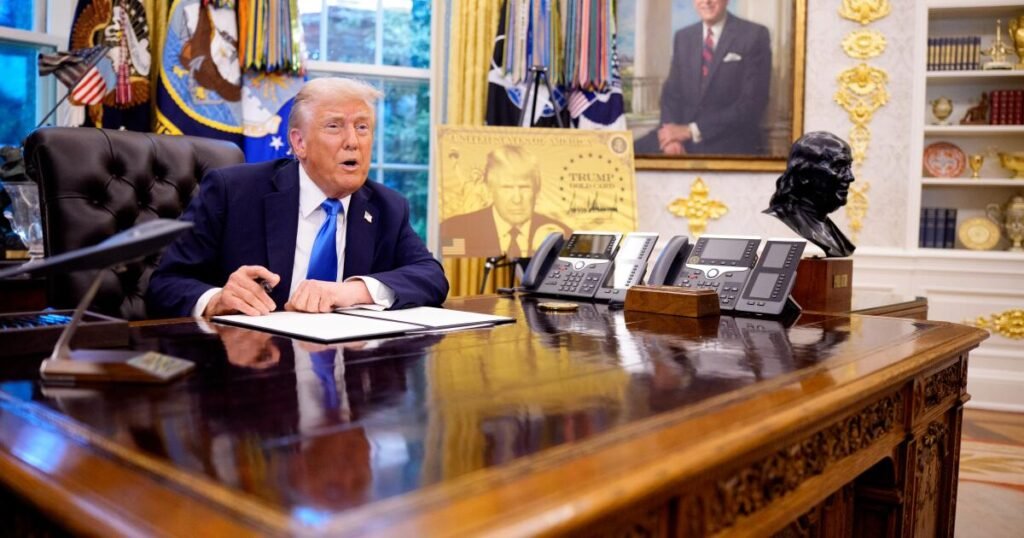Trump’s New Visa Fees Impacting Silicon Valley
The recent hike in Sky High Visa Fees by President Trump has sent ripples through Silicon Valley as tech companies weigh the implications on hiring global talent. This change comes at a time when the tech sector is already dealing with the challenges of unpredictable tariffs.
The H-1B Visa program, crucial for bringing in engineers and coders from around the world, has been thrown into confusion for businesses, immigration attorneys, and current visa holders. Over the weekend, the administration clarified that new fees would apply to visas filed after a certain date, September 21. Importantly, existing H-1B holders won’t face restrictions on domestic or international travel.
Additionally, certain professions, like doctors, might be exempt from these fees, raising concerns that such selective exemptions could favor allies while adversely affecting critics.
Major tech companies—including Meta, Apple, Google, Amazon, and Microsoft—are forging closer ties with the Trump administration, pledging substantial investments in the U.S. However, the relationship between these companies and the administration has long been fraught, especially regarding immigration. Many executives, including founders of prominent tech companies, have themselves benefited from the H-1B visa program.
Elon Musk, a notable advocate for the H-1B visa, has had a complicated relationship with Trump. While he has supported the administration, conflicts arose over Trump’s budget cuts. Musk, originally from South Africa, is a naturalized U.S. citizen who himself holds an H-1B visa.
High-tech leaders emphasize the importance of the H-1B program for securing skilled labor, particularly as competition for top talent intensifies with advancements in artificial intelligence. New fees may deter international hires and slow California’s tech growth, which could be particularly tough on small startups with limited budgets.
This fiscal year, over 7,500 companies in California have applied for H-1B visas, with approximately 61,841 applications approved, according to U.S. Citizenship and Immigration Services data.
Darrell West, from the Brookings Institution, pointed out that many sectors, including technology and agriculture, depend on immigration to fill workforce gaps. He noted, “Trump might talk tough about immigration, but he doesn’t recognize its importance to our economy.” Cutting off talent flow could be devastating for those industries.
The administration argues that some companies misused the visa program, highlighting layoffs in tech and the difficulties faced by recent graduates in finding jobs. “Trump is committed to prioritizing American workers,” said White House spokesperson Taylor Rogers, suggesting that new fees would discourage misuse and help raise wages.
However, many economists and tech leaders attribute employment trends to other factors, like tariff-related economic uncertainty and the rise of AI tools that might replace entry-level jobs. Interestingly, California’s unemployment rate of 5.5% in August exceeded the national figure of 4.3%.
The announcement regarding these new fees has been described as “very confusing.” While the administration has attempted to clarify the situation, many tech firms still have numerous questions about how the fee structure will work. Adam Kobasevic, CEO of a technology policy coalition, expressed frustration as unpredictable decisions seem to characterize the administration’s approach.
Tech companies are trying to manage their relationships with the Trump administration carefully. In past instances, major executives from companies like Meta, Amazon, Google, and Apple spoke out against travel restrictions imposed during Trump’s first term. However, now, they are seeking to influence AI policies and nurture positive relationships with the government.
Changes to the H-1B visa could potentially strain relations with countries like India, which represents the largest portion of approved H-1B petitions, accounting for 71% of total applications, followed by China at about 12%.
Some Indian tech investors see a bright side in the uncertainty. The unpredictability surrounding visa policies might inspire local engineers to launch startups, potentially bolstering India’s tech scene and increasing competition for U.S. firms. Kunal Bahl, an Indian entrepreneur, encouraged innovation back home with a message on social media, promoting his company’s seed funding efforts aimed at attracting talent.
According to Phil Fersht, CEO of HFS Research, if the U.S. continues to present itself as an unwelcoming destination for skilled workers, it could lead companies to establish operations overseas, further affecting the economy.







